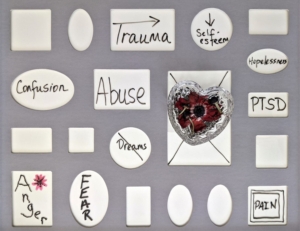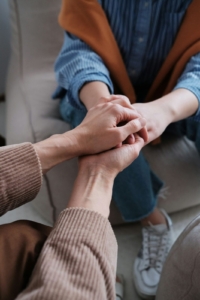PTSD (post-traumatic stress disorder) is a mental health disorder that can develop as the result of a person witnessing or experiencing a shocking, terrifying, dangerous, traumatic event such as war, physical or mental abuse, violence, captivity, an act of terrorism, or a natural disaster, where someone’s life was threatened, or a severe injury or death occurred.
How PTSD and relationships interact
PTSD symptoms can create issues with trust, closeness, and communication that affect the way a trauma survivor suffering from PTSD acts toward others. This, in turn, influences how they respond to the survivor’s actions, which impacts his or her reaction to their response, creating a downward spiral that can harm the relationship.
Each person’s experience of trauma is unique, however. Not all trauma survivors develop PTSD, nor do all people with PTSD have relationship problems.
Common reactions of trauma survivors with PTSD
Trauma survivors with PTSD often have flashbacks in which they relive the traumatic event(s) in such vivid detail that they will go to any lengths to try and avoid situations that might trigger these memories and the distressing feelings that accompany them. They may also suffer from recurring nightmares, which interfere with their ability to sleep and prevent them from getting enough rest.
 Lack of sleep and intrusive thoughts and memories may lead the suffering survivor to feel irritable, on edge, jumpy, easily startled, have trouble communicating, say things he or she doesn’t mean, and find it difficult to relax or be intimate with loved ones.
Lack of sleep and intrusive thoughts and memories may lead the suffering survivor to feel irritable, on edge, jumpy, easily startled, have trouble communicating, say things he or she doesn’t mean, and find it difficult to relax or be intimate with loved ones.
In some cases, trauma survivors with PTSD struggle with intense anger and emotional outbursts. They may avoid closeness or push friends or loved ones away in an attempt to suppress their angry feelings and resulting behaviors.
Or they may become verbally or physically abusive or turn to drugs or alcohol to cope. In other cases, they may need to be dependent and taken care of. Others may feel a strong need to try to protect those close to them and come across as demanding or smothering.
Trying to deal with PTSD symptoms can take up a lot of the trauma survivor’s energy and attention, making it difficult for him or her to focus on someone else, listen attentively to what the other person is saying, or be able to talk through problems and make joint decisions with a spouse or loved one.
Common reactions of others to trauma survivors with PTSD
People in a relationship with someone who is suffering from PTSD may feel confused, hurt, or cut off by the other person’s distance, moodiness, and emotional outbursts, and become angry and distant themselves. They may feel tense, frustrated, on edge, or as though they are walking on eggshells. In some cases, they may feel pressured, controlled, under constant threat of danger, or as if living in a war zone.
How to support someone close to you who struggles with PTSD
The first step in being able to support someone close to you who is struggling with PTSD is to gain an understanding of what PTSD is. Learning all you can about it will help you know what to expect, how to empathize and be there for him or her in times of need, and create a safe and supportive environment with minimal triggers.
It can also enable you to keep things in perspective and not take it personally when you are on the receiving end of your loved one’s pain and frustration.
Be patient and understanding
Saying the wrong thing can make your loved one feel even more isolated and misunderstood. Be patient, empathetic, supportive, and understanding, rather than pressure him or her to confront their fears. If an event becomes triggering, be willing to change your plans to keep them safe.
Don’t pressure them into talking
Encourage open communication, but respect your loved one’s boundaries, and don’t try to pressure them into talking. Instead, let them know that you are there for him or her and willing to listen whenever they feel comfortable doing so.
Don’t imply there is a timeline
Don’t try to downplay the traumatic event or your loved one’s feelings, oversimplify the recovery process, or imply that there is a deadline by asking them why they can’t just move on or get over it already. People can’t just snap out of PTSD.
Trauma can impact the brain and nervous system and leave a person suffering from PTSD stuck in a state of constant alert. For them, it’s not just something that happened in the past. For them, it is still happening physiologically and psychologically right now every time he or she is triggered.
Listen without judging
 Recognize that your loved one’s experience and feelings are unique to them and that it is not possible for you to fully understand what they are going through. Be a good listener and allow them to be in charge of their own narrative.
Recognize that your loved one’s experience and feelings are unique to them and that it is not possible for you to fully understand what they are going through. Be a good listener and allow them to be in charge of their own narrative.
Listen empathetically without judging, trying to explain away their fears, dismissing their feelings and experiences by accusing them of exaggerating, or challenging their memory of the trauma. If he or she tells you something difficult to hear, try to stay neutral and their feelings rather than react. Just sitting and listening can help provide him or her with the sense of safety and trust they are trying to restore.
Don’t try to put a positive spin on the past
When a person suffering from PTSD tells you about the difficult parts of his or her traumatic experience, listen attentively to what he or she is saying, without trying to put a positive spin on it. Statements such as “look on the bright side,” may come across as minimizing their feelings and making them feel invalidated rather than reassured or supported.
Ask about triggers
Ask what triggers flashbacks and how you can help your loved one avoid or manage them. Understanding their triggers will enable you to help create a safe environment that minimizes their exposure to them, as well as prepare you to respond in a healthy way if you recognize that they are being triggered and starting to feel unsafe. Having a plan in place will make the situation less frightening.
Give him or her space
Give your loved one space. Getting too close or grabbing a person suffering from PTSD may act as a trigger and make them feel threatened.
 Don’t say you know how he or she feels
Don’t say you know how he or she feels
Don’t assume you know how a trauma survivor struggling with PTSD feels, what they need, or give unsolicited advice. Doing this minimizes and invalidates their unique experience.
Create a well-defined daily routine
Structure and routine can help provide a sense of stability and security to a person suffering from PTSD. Try to create a schedule for your relationship that you can stick to that will provide your loved one with a sense of comfort and safety.
Encourage them to seek professional help
PTSD is treatable. A trained mental health professional can help your loved one learn effective coping skills to manage their symptoms and improve their relationships, as well as equip them with healthy ways of expressing anger and frustration.
If you have questions about this article on PTSD and relationships, and/or would like to set up a risk-free appointment to meet with one of the faith-based counselors at our location, please give us a call.
References:Hope Gillette. “How Does PTSD Affect Relationships?” PsychCentral. Updated April 16, 2021. psychcentral.com/ptsd/relationships.
“PTSD: National Center for PTSD.” U.S. Department of Veterans Affairs. ptsd.va.gov/family/effect_relationships.asp#.
“Misty Forest”, Courtesy of Joshua Earle, Unsplash.com, CC0 License; “Comfort”, Courtesy of Andrej Lišakov, Unsplash.com, Unsplash+ License; “Brain Map”, Courtesy of Alex Shuper, Unsplash.com, Unsplash+ License; “Trauma”, Courtesy of Susan Wilkinson, Unsplash.com, CC0 License












